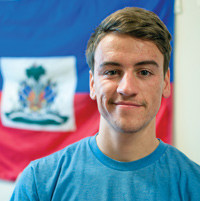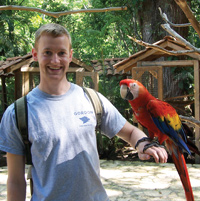STILLPOINT Archive: last updated 11/21/2011
Using Microfinance Loans to Help the Poor
 Dan Pfistner ’13, an economics major, needed to find a summer internship as part of his year in the Elijah Project honors program. Because of his love for Haiti, where he had gone on five mission trips, and his interest in microfinance, Laura Carmer, codirector of the Elijah Project, connected him with Partners in Development. PID is a nonprofit organization that works with those living in extreme poverty in Haiti and Guatemala. In addition to health care, housing and education, PID offers a small microfinance program that helps families receive business training and the loans that provide them with enough capital to start small businesses—usually as roadside vendors or in stands in the market. The income helps families feed their children, and many businesses have grown and become quite successful.
Dan Pfistner ’13, an economics major, needed to find a summer internship as part of his year in the Elijah Project honors program. Because of his love for Haiti, where he had gone on five mission trips, and his interest in microfinance, Laura Carmer, codirector of the Elijah Project, connected him with Partners in Development. PID is a nonprofit organization that works with those living in extreme poverty in Haiti and Guatemala. In addition to health care, housing and education, PID offers a small microfinance program that helps families receive business training and the loans that provide them with enough capital to start small businesses—usually as roadside vendors or in stands in the market. The income helps families feed their children, and many businesses have grown and become quite successful.
As Dan began working with PID, he discovered that their microfinance program was documented mainly in notebooks, and on loose scraps of paper and the backs of envelopes. “My job,” he explains, “was to move disorganized information into a simple computer system to make the jobs of the Haitian staff more efficient. They now use accounting software I set up to keep track of small business loans, mortgages and other administrative/financial records.” Dan also acted as team leader for short-term teams that volunteered with PID, serving as a liaison between the visiting teams and Haitian staff.
Of his sixth time in Haiti, Dan says, “Spending more time here reminds me that people can bond, regardless of any cultural or socioeconomic boundary. The people I work with are my friends; we’re able to find much common ground despite our differences.”
But working in an office kept him from helping the poor directly: “I learned that, for me, sitting in front of a computer is not as energizing as interacting directly with those affected by extreme poverty.” Dan has used this insight to help shape his future. Because he loves the outdoors, he’d like to take recreation and community development to impoverished communities in South America, Africa and Asia. And he’d like to be hands- on in this work.
“This summer I have begun to understand what it might mean to live out Frederick Buechner’s well-known saying: ‘The place God calls you to is the place where your deep gladness and the world’s deep hunger meet.’”?
A Kinesiology Internship in Honduras
 As a participant in The Elijah Project honors program Bennett Shake ’13 needed to find a summer internship in his major—kinesiology, with a prephysical therapy concentration. In talking with Jessica Ventura, assistant professor of kinesiology, he discovered she had a connection with the director of Teletón in Santa Rosa de Copan, Honduras, a nonprofit rehabilitation clinic with sites all over Central America. Ventura pulled a few strings and set Bennett up with an internship that would influence him in big ways.
As a participant in The Elijah Project honors program Bennett Shake ’13 needed to find a summer internship in his major—kinesiology, with a prephysical therapy concentration. In talking with Jessica Ventura, assistant professor of kinesiology, he discovered she had a connection with the director of Teletón in Santa Rosa de Copan, Honduras, a nonprofit rehabilitation clinic with sites all over Central America. Ventura pulled a few strings and set Bennett up with an internship that would influence him in big ways.
Before the internship started, Bennett traveled to Honduras with other Gordon students to participate in a May–Summer Term kinesiology class with Ventura, partnering with Teletón and other medical organizations in Santa Rosa. The students learned about various disabling diseases and defects, observed the disabled in different clinics around nearby towns, and learned how the disabled are supported in Honduras.
Returning to Teletón for his internship was eye-opening. “Originally the goal of my internship involved seeing what physical therapy was like in a developing country, and finding out if I could one day see myself using PT abroad,” Bennett explains. “But the clinic I worked in had a lot of equipment that was comparable to U.S. therapy centers, something I wasn’t expecting.” Bennett observed the special education department, adult physical therapy and child physical therapy.
“The hardest part about being abroad was the language barrier,” he explains. “But the relationships were easy because people were so friendly. They also showed a lot of grace and patience as I tried to express myself in Spanish.
“If I end up doing PT in a developing country, I know I could never only do PT. Health is more than just visits to the doctor. It includes agriculture and proper nutrition, adequate shelter, a safe environment, a good community and a host of others things that relate to emotional, physical and spiritual health. This burden I feel for the poor and destitute is something that needs to be a part of my life wherever I live.”
www.gordon.edu/academics/kinesiology
| Share this story: |   |
NEXT: A New Chapter